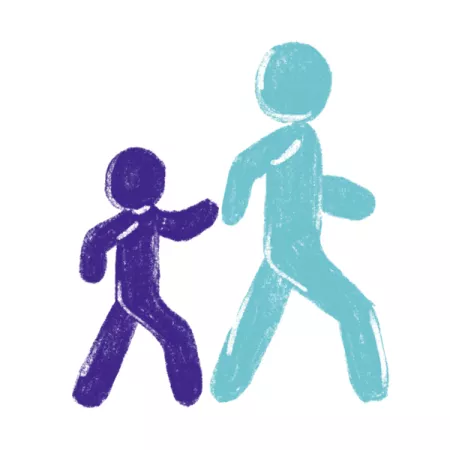Heading to college or university? We reached out to our social media community for their top tips on succeeding at college and university when you are a young person living with epilepsy.
Tips for going to college with epilepsy
College is an exciting time, as you transition between childhood education and adult life. Going to college with epilepsy has some additional complications, but our followers have reached out over Facebook and Instagram to help make the experience as easy and enjoyable as possible.
It‘s ok to need more time for your studies, don’t feel bad because the others are faster. When you have seizures it can affect your memory, concentration and how fast/much you can learn. So don’t be angry with yourself!
This supporter reminds you not to be critical of yourself for needing more time to process information when you are living with seizures. The same applies if you need to access your studies differently, such as by using a Dictaphone to record lessons.
Seizures, anti-seizure medication, and the pressures of epilepsy are bound to affect you but don’t need to limit your possibilities.
Speak to the higher education counsellor or therapist. Mine was absolutely wonderful. Make sure your teachers know you have epilepsy and share with people in your classes so you can get the help you need.

Having good communication with your college about your epilepsy can help them make the reasonable adjustments required to support you to fully access your education. This user recommends a councillor or therapist, but your college may have other professionals or networks that suit you better.
Don't feel like you have to explain yourself to everyone you meet (unless you want to), it can be exhausting.
Though the college should know about your epilepsy so they can respond correctly should you have a seizure or other epilepsy related problem, this advocate reminds you that it’s up to you who else knows. If you don’t feel comfortable sharing with new people, you are entitled to privacy.
Know your triggers as much as possible and don't be pressured to push them by anyone.
This user also encourages you to respect your boundaries. College is a time when you are becoming an adult and new experiences begin to materialise around you, but don’t feel pressured to do anything that could compromise your health. Good friends will understand your triggers and good decisions will help your flourish socially, academically, and personally.
Don’t let the school bullies get you down!
In college, your peers should have matured a lot since school, but unfortunately there is no upper limit on being bullied by ignorant people. Never forget that this is unacceptable, your college has a duty to act on bullying, and that this behaviour says far more about the bully than it does about you.
Hold your head up high and find a community that supports and celebrates you; it’s out there!
You are not alone!
College can be as scary as it is exciting, but, as this supporter says, you are not alone. Plenty of other young people with epilepsy are going through or have been through the same process, so connecting with them for tips is a great idea.
Even people without epilepsy will have concerns about adapting to the opportunities and demands of college, just remember that you are all in this together.
Check our our guidance for parents/carers when it comes to higher education

Tips for going to university with epilepsy
Whether you are going to a local university or moving away from home for the first time, there will be a lot of ‘new’! Our followers gave us an abundance of tips for how to navigate this milestone in life.
Practical tips for going to university with epilepsy
Young people at university, those who have completed their degrees, and supportive family members have all got some great, practical life hacks to make your university experience comfortable and welcoming.
If you haven’t already take responsibility for ordering and collecting your medication, your parents worry!
Of course, your parents and carers will be worrying about you! Making sure you are on top of your medication and comfortable transitioning to adult healthcare is an easy way to keep yourself healthy and let your family feel confident that you are independent and can manage your condition.
If you’re staying in a shared apartment have a ‘what to do if you have a seizure’ placed where everyone can see it.

Moving into an environment where people are unfamiliar with your seizures can be a lot easier when the subject is open, normalised, and your housemates know what to do.
Anyone you room-share/house-share or live in the same dorm with should know regardless, because at the end of the day, we are unconscious so we have no idea who does what. The more that know, in my opinion, the better.
This follower agrees. Trusting new people can be difficult, but most of our responders encourage new university students to let those nearest to them know how to best respond. If you don’t feel supported by your housemates, reach out to your university.
You should have a course co-ordinator and student advisor that you can link in with. If necessary, they will have a system for explaining to the lecturer's if you need time off.
Universities have many resources and accommodations for young people with epilepsy. We also have epilepsy training courses for education professionals should university staff be unsure how to accommodate your epilepsy.
You can ask for extensions to submit your academic work
Universities have to make reasonable adjustments and should be cognisant of the impact your seizures and medication may have on your academic work. Communication is key!
Your university probably has a service for students with disabilities (SSD)! You can likely get an advisor and get accommodations with school, living, and transportation!
Another user encourages you to find out what your university offers should you need extra accommodations.
Go online and read up on Disability student allowance (DSA). You can get help and money towards equipment such as a laptop and printer. Very helpful for my daughter who had epilepsy throughout her time at uni.
This follower reminds you that it’s not just the university that can help you out. As an adult, you may be entitled to extra assistance for your needs.

Going out and self care at university with epilepsy
When it came to going out and drinking, we received a wide range of tips from those who have been through it, with some coming out strongly against, and others being more flexible.
There's plenty of alcohol-free drinks at bars now, don't risk SUDEP just to impress your friends. Find friends, who don't need to drink to have fun.
This user stresses the importance of putting your health first, considering alcohol can be a serious trigger for many with epilepsy.
When those parties start, get yourself alcohol free Peroni, you won't be able to tell the difference!
Another supporter provides a solid tip for remaining part of the fun without risking a seizure trigger.
Watch out on the boozy nights (drink lots of water, know your limits!) and get plenty of sleep! Don’t forget your meds. But enjoy life and don’t let your epilepsy stop you doing what you love!
A different perspective encourages you to responsibly enjoy the experience if that is what you want to do. A reminder that taking your meds as prescribed, especially when going on nights out, will ensure you stay on top of your seizures.
Try to get a good amount of sleep. A lot of student socialising involves late nights, but there are other options too - societies for things you are interested in are a great way to make friends.
Sleep was another issue that our responders had a lot of advice on, and this reply gives a tip that will help you rest well, nurture your interests, and meet like-minded people. Being unrested is often a major trigger for young people with epilepsy, so prioritise sleep just as much as your studies and social life!
Always care about your food. You don’t have to be starving!
Making the right choices isn’t just about whether to go out and or how much sleep you are getting. This user reminds you that a good meal goes a long way, particularly if you are looking after yourself for the first time!

The one best thing to come out of going to college or university is that you get such better support than what you would get during school and everyone is more understanding and caring. You meet friends who will help and support you and want to learn how to best look after you if you needed help.
Our final supporter encourages you to make the most of this once-in-a-lifetime experience! Utilise your institution's resources, make lifelong friends, and start adulthood with an unforgettable university experience!







